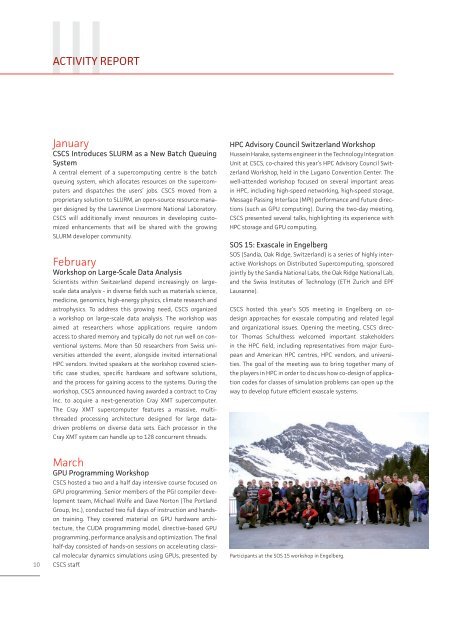Annual Report 2011 - CSCS
Annual Report 2011 - CSCS
Annual Report 2011 - CSCS
Create successful ePaper yourself
Turn your PDF publications into a flip-book with our unique Google optimized e-Paper software.
10<br />
III ACTIVITY REPORT<br />
January<br />
<strong>CSCS</strong> Introduces SLURM as a New Batch Queuing<br />
System<br />
A central element of a supercomputing centre is the batch<br />
queuing system, which allocates resources on the supercomputers<br />
and dispatches the users’ jobs. <strong>CSCS</strong> moved from a<br />
proprietary solution to SLURM, an open-source resource manager<br />
designed by the Lawrence Livermore National Laboratory.<br />
<strong>CSCS</strong> will additionally invest resources in developing customized<br />
enhancements that will be shared with the growing<br />
SLURM developer community.<br />
February<br />
Workshop on Large-Scale Data Analysis<br />
Scientists within Switzerland depend increasingly on largescale<br />
data analysis - in diverse fields such as materials science,<br />
medicine, genomics, high-energy physics, climate research and<br />
astrophysics. To address this growing need, <strong>CSCS</strong> organized<br />
a workshop on large-scale data analysis. The workshop was<br />
aimed at researchers whose applications require random<br />
access to shared memory and typically do not run well on conventional<br />
systems. More than 50 researchers from Swiss universities<br />
attended the event, alongside invited international<br />
HPC vendors. Invited speakers at the workshop covered scientific<br />
case studies, specific hardware and software solutions,<br />
and the process for gaining access to the systems. During the<br />
workshop, <strong>CSCS</strong> announced having awarded a contract to Cray<br />
Inc. to acquire a next-generation Cray XMT supercomputer.<br />
The Cray XMT supercomputer features a massive, multithreaded<br />
processing architecture designed for large datadriven<br />
problems on diverse data sets. Each processor in the<br />
Cray XMT system can handle up to 128 concurrent threads.<br />
March<br />
GPU Programming Workshop<br />
<strong>CSCS</strong> hosted a two and a half day intensive course focused on<br />
GPU programming. Senior members of the PGI compiler development<br />
team, Michael Wolfe and Dave Norton (The Portland<br />
Group, Inc.), conducted two full days of instruction and handson<br />
training. They covered material on GPU hardware architecture,<br />
the CUDA programming model, directive-based GPU<br />
programming, performance analysis and optimization. The final<br />
half-day consisted of hands-on sessions on accelerating classical<br />
molecular dynamics simulations using GPUs, presented by<br />
<strong>CSCS</strong> staff.<br />
HPC Advisory Council Switzerland Workshop<br />
Hussein Harake, systems engineer in the Technology Integration<br />
Unit at <strong>CSCS</strong>, co-chaired this year’s HPC Advisory Council Switzerland<br />
Workshop, held in the Lugano Convention Center. The<br />
well-attended workshop focused on several important areas<br />
in HPC, including high-speed networking, high-speed storage,<br />
Message Passing Interface (MPI) performance and future directions<br />
(such as GPU computing). During the two-day meeting,<br />
<strong>CSCS</strong> presented several talks, highlighting its experience with<br />
HPC storage and GPU computing.<br />
SOS 15: Exascale in Engelberg<br />
SOS (Sandia, Oak Ridge, Switzerland) is a series of highly interactive<br />
Workshops on Distributed Supercomputing, sponsored<br />
jointly by the Sandia National Labs, the Oak Ridge National Lab,<br />
and the Swiss Institutes of Technology (ETH Zurich and EPF<br />
Lausanne).<br />
<strong>CSCS</strong> hosted this year’s SOS meeting in Engelberg on codesign<br />
approaches for exascale computing and related legal<br />
and organizational issues. Opening the meeting, <strong>CSCS</strong> director<br />
Thomas Schulthess welcomed important stakeholders<br />
in the HPC field, including representatives from major European<br />
and American HPC centres, HPC vendors, and universities.<br />
The goal of the meeting was to bring together many of<br />
the players in HPC in order to discuss how co-design of application<br />
codes for classes of simulation problems can open up the<br />
way to develop future efficient exascale systems.<br />
Participants at the SOS 15 workshop in Engelberg.


